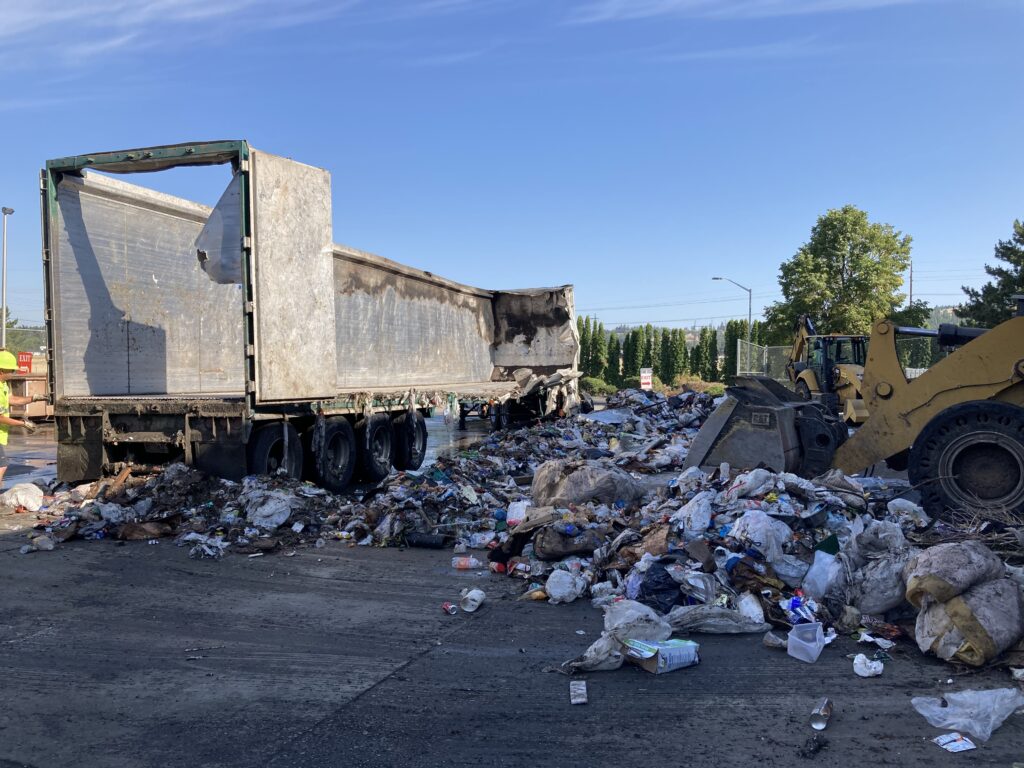Battery fires are a monthly occurrence on tipping floors at the transfer stations. Most of the time, staff are quick to spot the smoke and sparks and can quelch them with a fire extinguisher before any damage occurs. However, no matter how small the fire, unloading bays must be evacuated of all customers waiting to unload their garbage. Staff will then spread out the garbage and attempt to find and remove the damaged battery, and then wait several minutes to ensure secondary hot spots don’t emerge. Only after this timely process can operations return to normal. Improper battery disposal can put staff and residents in harm’s way.

All batteries are considered Household Hazardous Waste, however lithium-ion batteries pose a particular risk of fire. These batteries retain enough power after considered “dead”, to cause a spark when crushed against other objects or against a concrete floor. When curbside garbage and trash is picked up from a home, it’s loaded into a truck that compacts as much material in its hopper as possible, smashing those batteries against materials already in the truck. When that truck delivers garbage to the transfer station, it’s unloaded, and materials are pushed by a loader with a metal bucket against more sharp or hard objects and surfaces. These are ideal conditions for a lithium-ion battery to spark.
One damaged battery can generate visible sparks immediately, or a slightly damaged battery can generate small amounts of heat that results in a reaction hours later. One such instance occurred last fall. A small pile of garbage was left on the tipping floor overnight where a damaged battery generated enough heat over time to catch fire. Black smoke started to billow from the tipping floor building. The heat set off the sprinkler system, which is designed to let loose thousands of gallons of water per minute onto the tipping floor. The fire department arrived and used fire hoses to continue extinguishing the fire. Chemical fires from batteries do not follow the same rules as wood-based fires. Even after thousands of gallons of water were used, the battery fire re-ignited. The two-in-one battery fire flooded the building and the infrastructure. Luckily, there was limited damage to our infrastructure. However, the entire facility was closed for several hours that morning while transfer station staff mopped up the mess. This facility closure impacted garbage truck routes and the public who use that transfer station on a regular basis.
These fires are not just happening at our transfer stations. Battery fires are happening at our local Waste to Energy Facility, at the local recycling sorting facility, in garbage trucks, recycling trucks, and at landfills around the world. This is an international issue that can be solved with individual action.
Transfer station staff need your help. Waste to Energy staff need your help. Drivers of garbage trucks and recycling trucks need your help. Landfill operators need your help.
Take steps to safely dispose of batteries so our people, facilities, and equipment can remain safe. Will you help us?
Follow these simple steps for safe battery disposal.
- Do not throw batteries in garbage and recycling containers.
- Store batteries in a flame-resistant container, taping the ends with non-conductive tape.
- Use the SpokaneWasteDirectory to locate where to take your batteries for free recycling.
- Follow through! Take your batteries to designated drop-off locations for safe processing and recycling.
